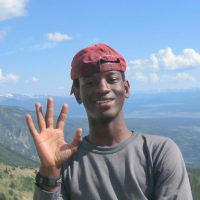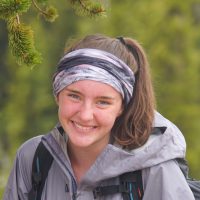Lilli Lewis
Building A Colony
Louisville Collegiate School
Louisville, Kentucky
It’s said that ants can carry up to 10 times their weight. I recently took two backpacking trips with High Mountain Institute, and I have never related to an ant more than during those sets of 11 days.
At every moment, members of my group talked each other through tough situations, be that hiking up a particularly difficult slope, or trying to get centuries-old stoves to light without, in turn, setting the forest ablaze. Through this unity, we subconsciously emulated the ecosystem around us.
On day five of the first trip, I was sitting in an aspen grove, staring at the Kinnikinnick-carpeted ground, when I caught a glimpse of an incredible event. Two ants, black shells shining in the sun, marching down sticks and leaves, working together to carry a twig. One pulled too hard and left without the other, shouldering the burden alone. It was able to continue briefly, however, the stick soon became stuck between two leaves and the ant was forced to leave it. Working together, they were successful, but when their team fell apart, their mission failed. I saw moments like these, tucked between the pine trees, sprawled over the trails, quite frequently.
On day four of the same expedition, my group was struck by tragedy. We were trudging along through the mud when suddenly, I heard a cry of pain and looked back to see a member of my group on the ground in agony. He had sustained a knee dislocation. Initially, he was able to continue our trek, but as the hike continued, his pain grew and his ability to walk dwindled. The instructors worked together to fashion a brace for him using bandanas, sleeping mats, and a pole, and this worked until he could no longer walk. It was at this moment, while the instructors and a voluntary student took turns carrying Liam on their backs, that I realized that I was about to lose a member of my team. I needed to solidify my bonds with the rest of them, building connections until we were a colony. Mirroring the ants, they were able to safely transfer him to the trailhead, where we said our goodbyes.
On the fourth day of our second expedition, my tent was set up in a clearing on a ridge. The view was wonderful and the ground was flat, so we were pleased. However, that night, a lightning storm struck, making our ideal location into an unprotected area with a lightning rod at its center. Our instructor burst into the tent, directing us to kneel on our sleeping mats and counting the seconds in-between lightning and thunder to determine how close the storm was. We were in the least ideal situation imaginable, fear coursing through our veins, when Olivia reached out her hand and whispered to me, “I don’t want to die.” I felt powerless. All I could do was squeeze her hand.
When an anthill is stepped on, the tunnels are crushed. The ants inside panic and frantically try to rebuild their colony for their queen, desperate to return things to their former state.
An unknown threat, a foot, had stomped on our anthill. It ruined our carefully crafted tunnels and caused widespread panic in our colony. Nobody liked soaked layers. We were electrified with fear and it was easily visible. However, as the storm died down and the threat went away, we calmed down and began working together in harmony once again. Wet layers were laid out, shoes were hidden under tent flaps, and we all talked through our terror and were able to laugh about it. We talked for hours afterwards, and at the end of the night, I could feel the bonds of family growing between us. In the end, we became an ant colony, carrying immense weight on our backs, struggling up hills, and working as a unit to achieve success.



